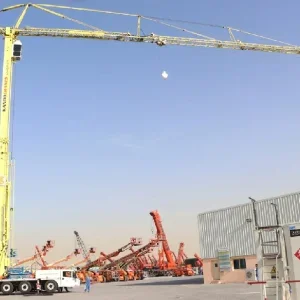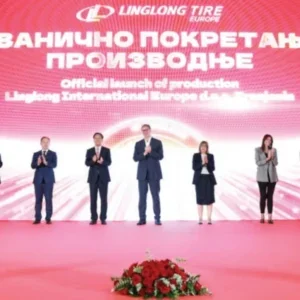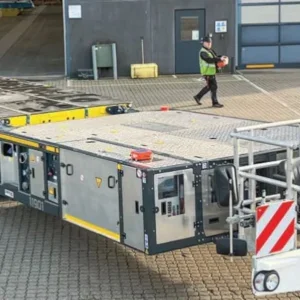Danger, in the world of cranes, comes in many forms – and by no means all of them involve lifting directly. In US construction, mining, and industrial facilities in the decade to 2021 there were 1,807 deaths from off-road collisions – not all of them with lifting equipment, but all of them on off-road sites of the kind where cranes are ubiquitous. Overall there were 143 non-roadway collision deaths recorded by the US Bureau of Labor in 2021, a rate that is similar to previous years. The research is from industrial safety specialist Carroll Technologies Group and is based on data from the US Bureau of Labor Statistics.
Carroll has produced a free five-point collision avoidance alert safety poster (right) which is available for download from https://bit.ly/3Ha65VI, along with full research data and information on recommended collision avoidance technologies.
Europe also recognises the importance of training in all aspects of crane work. ESTA, the European association for the abnormal road transport and mobile crane rental industry, introduced for the first time in 2023 in its annual awards a training category. It was won by Liebherr for the company’s training concept, which offers target groupspecific training to enhance safety in the crane industry and support job development.
Liebherr offers a range of courses in various formats, available worldwide. To help its customers it adapted and expanded its learning methods, including digital formats, during the pandemic. Liebherr has established training centres globally and incorporates digital training within its MyLiebherr customer platform.
According to Christoph Behmüller, head of the training department at Liebherr in Ehingen, finding and developing skilled workers has become increasingly challenging: “Therefore, Liebherr aims to support its customers in employee development. We have devised a new concept that offers training for three areas: mobile crane operators, dispatchers, and workshop personnel. Each target group is provided with a digital e-learning course as a foundation, followed by practical training weeks in Liebherr's training departments worldwide, where specific equipment and controls are studied in-depth.”
UK FAILINGS
All of which makes it concerning that new research conducted by training and assessment provider Cloud Assess has revealed that the UK construction sector is lagging behind when it comes to conducting employee safety training.
The title of its report says it all: ‘Fatal negligence: Unveiling the deadly consequences of inadequate employee training.’
Using data from the HSE (Health and Safety Executive) it confirms the clear link between annual industry fatality rates and the training available to employees, with construction found to be the worst-performing sector.
Construction, it says, has the highest fatality rate of the high-risk industries that were studied (transport, construction, utilities, and manufacturing) and is offering less frequent and less comprehensive training than other sectors.
Their report shows that, on average, the industries with higher fatality numbers offer less training per employee per year than safer industries. 54% of employees in the construction industry go through training every single year. In contrast the utilities sector, the safest industry researched, has 65% of its employees complete annual training.
The research also reveals a link between safety and the measurement of training: industries with higher fatality rates are least likely to measure skills competency using meaningful metrics. For example, construction firms are half as likely to measure the success of training based on genuine behaviour changes than those in utilities.
Rob Bright, founder of Cloud Assess, comments: “Whilst attitudes towards workplace safety have begun to shift in recent years, employees across the UK continue to lose their lives at work every single year due to a lack of training designed to build competency and improve safety. Last year alone 30 construction workers died whilst doing their job.
“This doesn’t have to be the case. Our research shows that lives could be saved by providing all those working in high-risk roles with adequate training. The bare minimum is no longer enough when it comes to instilling essential skills in employees. Executives must take accountability for the safety of their employees and this means training for safety, not audits.”
Fortunately, there are companies that take training – and the metrics that were mentioned above – seriously and one way of demonstrating this is via an accreditation programme.
UK crane hire company Ainscough Crane Hire, which operates its fleet of over 400 cranes from a network of 30 depots, has recently become the first construction company in the UK to obtain the Driver and Vehicle Standards Agency (DVSA) Earned Recognition.
This is an accreditation programme designed to recognise operators who have demonstrated a consistent track record of compliance with road safety standards and regulations. To attain this recognition Ainscough Crane Hire underwent a rigorous evaluation of its fleet operations, driver performance, maintenance practices, and adherence to road safety legislation.
Safety, of course, is the prime upside but as part of the Earned Recognition programme, Ainscough Crane Hire will also benefit from streamlined DVSA compliance checks, reduced inspection times and more efficient operations.
Kayla Burley, transport manager at Ainscough Crane Hire, said: "We are delighted to be the first firm in the construction sector to be awarded the DVSA Earned Recognition. The level of quality that the DVSA requires for the Earned Recognition isn’t easy to attain – it has taken a lot of concentrated effort to ensure that Ainscough is in a place to be considered, and the accomplishment is a testament to the consistent and rigid driver safety standards we look to uphold as a company.
"It is also testament to the hard work and organisation of our driving and operating staff, day in and day out. Having achieved it we’re extremely proud to become an industry benchmark and we look forward to continuing our pursuit of excellence in all areas.”
Another company committed to training, and to recognising the need for comprehensive and modern training facilities, is Falcon Cranes, which is the largest tower crane hirer in the UK.
The company has invested significantly in revamping its training yard in Shipdam, Norfolk. It is a learning environment for anyone who would like to train in lifting operations and other disciplines.
The newly refurbished training yard, and its newly built offices, contains four large classrooms, each equipped with the latest audio-visual technology; three dedicated cranes are permanently on-site in the yard. Together they set a standard for both theoretical and practical learning, says Falcon.
Falcon offers lifting operations courses both in-house and to the industry recognised standard Construction Plant Competence Scheme (CPCS). They include Tower Crane Operator – Cab Controlled – Trolley and Luffing Jib; Tower Crane – Trolley Jib – Remote Controlled (POTC); Slinger Signaller; Appointed Person; and Crane/Lifting Operations Supervisor. Other courses include Work at Height, Manual Handling, CPCS Plant Operative Health, Safety and Environment Test and CPCS Competence Interview, with more being added all the time.
Having three dedicated cranes eliminates the need to wait for a crane to become available on an external site. Falcon carries out training 51 weeks of the year where learners can gain hands-on experience operating the different types of cranes in a safe but realistic environment practicing their skills and building confidence.
The training team comprises industry veterans with almost 100 years of experience between them. Everyone is welcome to learn there. For more information, and to enquire about course availability, see its website at falconcranes. co.uk or email enquiries@ falconcranes.co.uk.
EASTERN WISDOM
Such companies, and such facilities, are not unique to the UK; nor are they confined to Europe.
Singapore is one of the world’s busiest crane markets; indeed, operators all across Asia are busier than they have been in years. Manitowoc has therefore opened a training facility at its regional headquarters in Singapore to provide support. It is intended for service personnel and is open to the service technicians of Manitowoc customers and dealers alike.
The new centre provides both in-person and online training courses on a weekly basis. The intensive courses generally last five days and are designed to offer in-depth immersion in procedures and techniques for the upkeep and optimum performance of Grove, Potain, or Manitowoc cranes.
As cranes become increasingly advanced, their maintenance involves much more than performing regular lubrication and traditional safety checks.
It is vital, says Manitowoc, that technicians are up to date with all the latest technologies – especially now the digital ones such as the ‘Grove Connect’ diagnostic and troubleshooting software – are now factory-fitted on most new GMK all-terrain cranes, and the equivalent ‘Potain Connect’ platform for tower cranes.
“With work levels being so high at the moment, crane owners are clearly recognising the importance of ensuring maximum uptime and extracting the most efficient performance from their cranes,” said Marco Zucchet, director of sales, after-sales, and marketing at Manitowoc in Singapore. “Since the world began opening up again after Covid our training centre has already proved to be a huge success, with many dealers and customers either flying in technicians from across Asia to attend these courses or signing them up for virtual participation.
“The verdict of those technicians has been exceptionally favourable, with many appreciating the chance to get to grips with new or unfamiliar technologies in a much more relaxed environment than onthe- job learning usually allows.
"For the more experienced technicians their time with us also acted as a useful refresher course, ensuring they hadn’t slipped into incorrect or inefficient ways of working, while offering the chance to exchange ideas as part of our Voice of the Customer process.”
To find out more about training available from Manitowoc visit www.manitowoc.com/ support/training .
Training, of course, is not a once-only procedure. On-the-job appraisal hugely helps the newlyqualified. Technology advances call for new skills and understandings; even experienced operators need refresher courses. In the officialese language of British Standard 7121- 1:2016, Code of Practice for Safe Use of Cranes, “Formal refresher training and re-assessment might… be considered appropriate.”
The underlying message is clear: training, like safety, is something that cannot be neglected at any stage of a career.
TRAINING COURSE SHOWS YOU'RE 'NEVER TOO OLD TO LEARN NEW THINGS’
Service technicians from truck-mounted loader crane manufacturer HMF Group gathered for three weeks of training at the company’s headquarters in Højbjerg, Denmark.
Representatives from 12 different countries took part in the training that consisted of practice on a brand new 3220K5 crane for training purposes equipped with a fl y-jib 1000 K2, a hoist, the EVS and 2CYBEL-I systems
Course participants worked on the 3220's EVS setup, some sharing their decades-long experience working with HMF; others were glad to be revisiting the company’s headquarters. According to HMF, they all agreed that the course gave them the opportunity to refresh knowledge and refi ne their skills – as one of them expressed it: "You're never too old to learn new things".
STATE-OF-THE-ART PALFINGER CAMPUS MARKS 'IMPORTANT INVESTMENT'
In May 2023 knuckleboom maker Palfi nger opened a EUR 10 million state-of-the-art education and training centre at its Lengau production site in Austria.
“At the Palfi nger Campus we have created state-of-the-art training and education opportunities for existing and future employees making an important investment – for our company, for the region and for our entire European and global production and competence network,” said Andreas Klauser, CEO of Palfinger AG.
A panel discussion at the opening ceremony highlighted that since employees are the driving force behind the success of companies, only those employers who offer their staff exciting long-term prospects to improve their skills are considered attractive. Continuous, individual development is therefore of paramount importance to the company, says Palfinger.
The company and the campus offer a comprehensive range of development opportunities, from apprenticeships for high school graduates to training programmes for management.
The Lengau location is of particular signifi cance in this context: the very first Palfinger apprentices’ workshop was opened there 30 years ago. Today, over 120 apprentices are trained in 15 different technical and commercial professions.
Existing Palfinger employees also actively continue their education on campus on both a personal and professional level, either through training courses or inter-departmental assignments.
SENSE PREVAILS: CRANE-MAKERS CAN STILL USE CE CONFORMITY OF SAFETY
Safety is safety, irrespective of politics. Brexit ought not, one imagines, to have impacted that statement. The CE (Conformité Européenne) mark is used throughout the EU to certify that a wide range of items – everything from electrical goods to toys, even construction materials and lifting equipment – meet safety standards. Upon leaving the EU, in an attempt to separate the UK’s internal market from the European market, the UK government announced it would phase out CE marks for products marketed in Great Britain and replace them with an equivalent 'UKCA' mark.
It set dates for the change – initially the fi rst of January 2022 – which, under pressure from manufacturers’ bodies, it postponed, several times, to eventually settle on 31 December 2024 as a fi nal deadline. That would have marked a cliff-edge moment for manufacturers by which time they would have had to comply; and since the UKCA mark would have been recognised in the UK but nowhere else on the planet, makers who wished to export their products would have had to implement two different sets of regulations: the UKCA one for the home market; the CE one for exports. This would have added hugely to their regulatory burden. Overseas crane-makers would presumably also have had to UKCA-certify their products in order to sell them in Britain. One wonders how many of them would have felt the effort worthwhile?
The Lifting Equipment Engineers Association, LEEA, was one of the many bodies opposing the change. Finally, in August 2023, the government announced a U-turn: the CE mark would continue to be recognised in the UK into the indefinite future.
It was not a complete abandonment of the UKCA mark; manufacturers may still use it if they wish to. But it is far from clear why any manufacturer would choose a safety-conformity assessment that is recognised only in the UK over one that has UK and Europe-wide validity.
As Ross Moloney, CEO of the LEEA said at the time, “LEEA has been actively engaged in raising issues concerning UKCA marking and the diffi culties it presents to the lifting industry in discussions with UK Government and is pleased to see that a sensible approach is being adopted that will allow businesses to adjust.”






